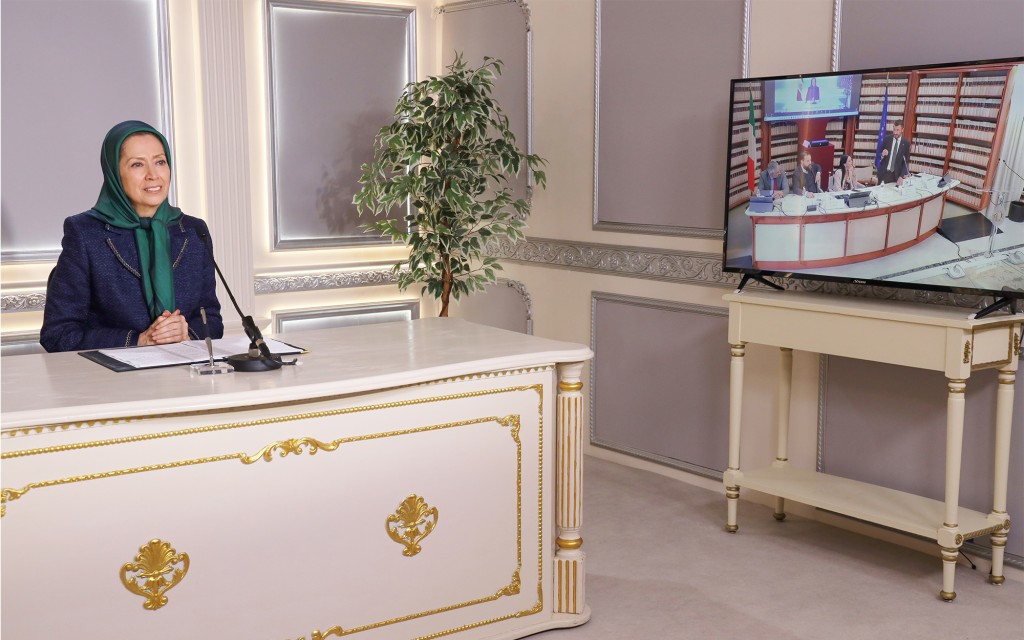Online Conference with Italian Parliament Members

Maryam Rajavi: The Clerical Regime Preserves Its Decadent Rule through Daily Executions
Honorable Members of the Italian Parliament and Senate,
Esteemed Friends,
I send you salutes on behalf of the Iranian people’s Resistance for freedom and democracy. I extend my sincere appreciation for your effective efforts in supporting the campaign against executions by a regime that holds the world record for the highest number of executions.
Five days ago, the resistant political prisoners at Ghezel Hesar Prison in Karaj in a statement appealed to the world’s awakened consciences for assistance in saving the lives of three PMOI supporters. These political prisoners have been sentenced to death by the regime’s judiciary, coinciding with the anniversary of the 2022 uprising.
For 35 weeks, political prisoners in over 20 prisons across Iran have been conducting weekly hunger strikes every Tuesday to protest the death penalty. Their courageous statements, issued from torture chambers and execution grounds, echo the voice of a resilient and defiant nation determined to bring down the regime of executions and massacres.
Daily Executions: A Tool to Maintain Power
The decadent Velayat-e Faqih regime clings to its deteriorating rule through daily executions. Khamenei, the regime’s leader, has built his authority on a sea of blood, stemming from the massacre of 30,000 political prisoners in 1988. Reports from the United Nations and human rights organizations confirm that, over the past 35 years of his rule, Khamenei has executed or murdered thousands in the streets and torture chambers. Since the regime’s new president took office, at least 180 individuals have been executed in this brief period.
I must emphasize that under the rule of this religious dictatorship, execution is not merely a punishment; it serves as a strategic tool for the survival of an illegitimate regime.
With executions occurring every few hours, Khamenei manipulates the level of repression. Over the past four decades, these executions have targeted all the populace, including political dissidents, Baluchis, Turkmens, Arab compatriots, and Kurdish compatriots, with particularly inhumane pressure exerted on Iranian Kurdish groups in Iraqi Kurdistan to displace them. Among the victims are also Sunnis, Baha’is, students, poets, intellectuals, lawyers, and even environmental activists. The victims span all ages, from teenagers to the elderly, including 13- and 14-year-old girls and pregnant women.
Particularly over the past two years, the regime has intensified its inhumane pressures on Iranian Kurdish groups in Iraqi Kurdistan. Khamenei’s judiciary functions as an execution machine. The moment this machine comes to a halt, the entire regime will collapse—and that day is drawing near.
The movement and resistance, which have endured and remained resilient despite relentless repression and executions, undoubtedly possess the strength to overthrow the mullahs’ regime.
An Iran Devoid of Torture and Executions
For a liberated Iran, free from the shackles of religious dictatorship, our Resistance steadfastly commits to the abolition of the death penalty. The mullahs’ attempts to subdue society through executions and torture have utterly failed. The suppression of our people’s demands for freedom and democratic progress cannot persist any longer. The economic, social, and cultural crises plaguing Iran can only be resolved through the embrace of freedom, democracy, equality, and justice.
According to the platform of the National Council of Resistance of Iran (NCRI), our society demands a modern, independent judiciary—one not governed by executioners, but grounded in the principle of the presumption of innocence, ensuring the right to defense, the right to appeal, the right to public trials, and full judicial independence and impartiality.
No to Executions Campaign: Ending the Mullahs’ Impunity
The No to Executions Campaign advanced by the Iranian Resistance both inside and outside of Iran is a crucial part of the people’s movement to overthrow the clerical regime.
For decades, the regime’s leaders have been shielded from any punishment for their ongoing crimes—an impunity granted to them by Western governments. The No to Executions campaign seeks to end this impunity.
This campaign seeks to awaken the global conscience. It is also a call to intensify and expand protests in Iran.
The No to Executions campaign seeks to reopen all cases of massacres and genocide perpetrated by this regime, from the killings of the early 1980s to the 1988 massacre, from the slaughter of protesters in Qazvin in 1994 to the murder of 1,500 young people during the 2019 uprising, and the 750 more lives lost in the 2022 protests.
The recent report by the United Nations Special Rapporteur on human rights in Iran has shed new light on the previously concealed realities of genocide in the 1980s. The UNSR emphasizes that the swift and arbitrary executions of political dissidents in 1981 and 1982, and the 1988 massacre, have never been investigated, nor have those responsible been held accountable.
According to the report, the mass killings, torture, and inhumane actions against members of the PMOI during the 1980s constitute genocide and crimes against humanity. The rapporteur further states that these crimes against humanity continue to this day.
On behalf of the Iranian people’s Resistance, I urge the United Nations, international human rights organizations, and governments around the world to stand against the hanging of prisoners and the massacre of protesters.
Therefore:
1. We urge governments to condition their diplomatic and trade relations with the clerical regime on the cessation of executions and torture.
2. We urge governments to, under the principle of universal jurisdiction, hold Khamenei, other regime leaders, and those responsible for crimes against humanity and genocide accountable by issuing international arrest warrants.
3. We request that the United Nations and its member states compel the regime to accept an international investigative delegation to inspect Iran’s prisons, particularly concerning the thousands of prisoners sentenced to death.
Thank you for your efforts and support.
- Tags: Human Rights, MEK, mullahs' regime, people of Iran

